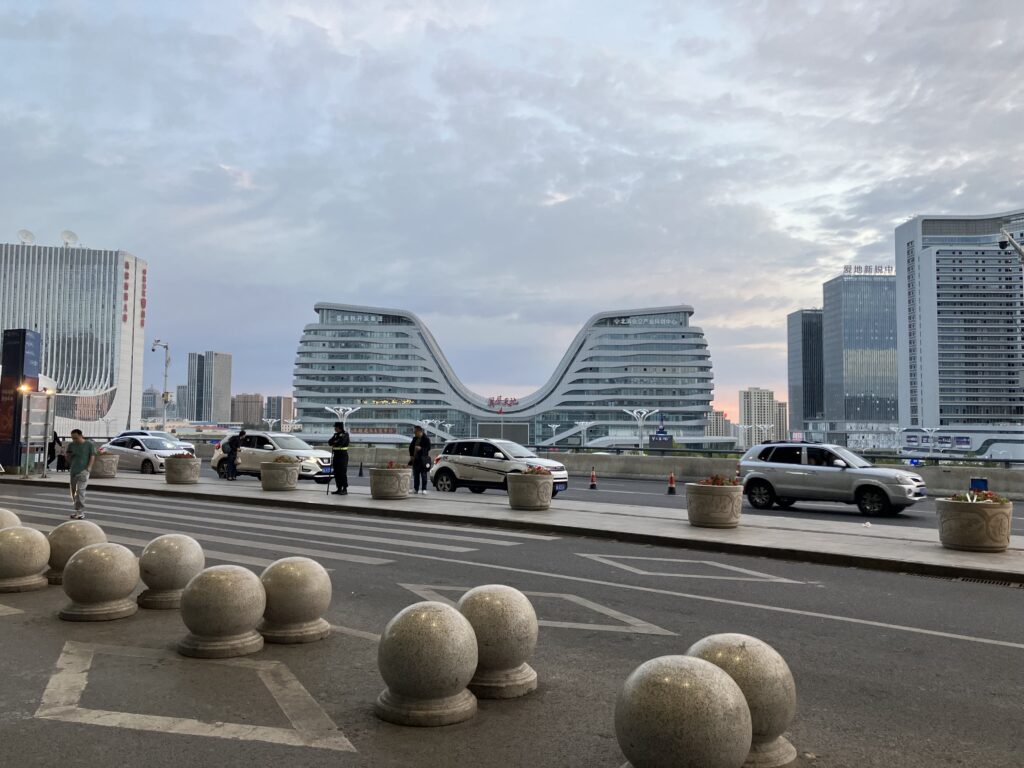The land of giants - Theo’s blog
China exceeds my expectations – even my expectation about how much it would!
As soon as we saw the swanky big red bus and the open-faced happily excited Chinese passengers waiting at Almaty bus station, I was confident we’d get over the border and reassured that we’d be meeting friendly people on the other side.
At the crossing from Kazakhstan’s border to China’s, there wasn’t any doubt that this was global superpower territory. The border entry is an impenetrable mix of total camera surveillance from every angle, tight razor-wire fenced traffic lanes, primed road traps, industrial sliding barriers, a wide steep-sided border ditch and watchtowers off into the distance.
And then you’re through to the imposingly wide, grandly constructed concrete hanger, like something built in a land of giants, which is the customs gateway into China. There was a lot to get through and some impressive tech to be scrutinised and interrogated by, but nothing particularly intimidating, and our bags weren’t even searched. It was the first place I saw public officials marching in line, when they came to change shift at the passport booths. Since then we’ve seen railway guards, security staff, catering crews and even builders walking in semi-military lines to their jobs, although not, generally, with an air of great discipline. It’s just something state workers do apparently.
There was another checkpoint when we arrived off the bus at Yining station that evening, still wide-eyed and hardly believing we were really there. The checks for concealed weapons and liquids were very thorough, reminding me that we’d arrived in China in the Xianjing province where the Muslim Uighur population are heavily controlled and monitored by the state. But the oddity was that the stern faced staff would quickly crack into smiles and casual banter. I’ve been told by a Chinese friend since that we were lucky and things could just as easily go the other way. I don’t doubt it.
But basically, as with Russia, it’s been great to humanise the people I might have feared. In the case of Chinese people, to blow away several racist tropes I’ve picked up over the years. It was good for me that our first evening in the country was spent mucking in with everyone else in a busy open sleeper carriage. I really like how unreserved, physically close, and self-confident these people generally seem to be, and particularly how emancipated in themselves the women were. I also like that it doesn’t really matter to them either way whether a Western European likes them or not. They’ve got it all going on in China, the oldest continuous civilisation on the planet.


Well done guys for making it there. I am very happy for & proud of you 🙂
Sending loads of love, Jem (& Emma) – from Sicily
I hope the mandarin lessons are going smoothly and that you’re staying somewhere beautiful, with a garden or some nature close by. Xxxx
We’ve immersed ourselves in China for the past few years: art, poetry, history… and love it, while at the same time being shocked and appalled by it. As the man at the border said, it could have gone either way. Such beautiful poetry and sublime spirituality, such dreadful and arbitrary brutality. I think China’s perennial, highly centralized authoritarian state leads to a society where people obey, act to please power, and override their human feelings to the point of cruelty. China has no problem in crushing dissenters, its people will gladly murder critics of the state knowing they are following the will of their leaders; even though those leaders will change the people will seamlessly remove the old guard and follow the new. At the same time, those in positions of power, having competed for office, knowing their dependency and vulnerability, and often longing for a quiet life on their estates, are supported by a cultural tradition that allows them to engage in great art that transcends their constraints. As Du Fu said in his most quoted, most establishment poem: “The state may fall, but the hills and streams remain.” It goes both ways. A powerful state, yet an individuality exemplified by the lone hermit on the mountain, by the absence of the hermit: “finding him gone” – the space on the canvas, the emptiness of the Dao.
Loving reading your blog posts. What an adventure.
Mr Max
Xx
aha, well, Theo, as I’ve just commented in the previous post, the situation in Xinjiang was rightly tense 15 years ago when partly CIA funded separatists/jihadists committed enough terrorist in attacks to kill over 1000 people in just a few years.
What Westerners don’t realise is that the majority of the victims of this terrorism were Uyghurs. They even bombed outside mosques and killed two Imams.
So contrary to what the Guardian or the NYT will tell you, Uyghurs are grateful for all the measures that were put in place, surveillance, police checks everywhere. These lasted maybe 5 or 6 years, coupled with a massive state investment to uplift the population with jobs and education, especially women. Uyghur women routinely are married at 14 and have 10 children. Not so much anymore.
But the Chinese authority don’t let their guard down. Why should they? It’s been admitted by former CIA officers that they’ve bee in Xinjiang since 1994, once they realised that Tibet wasn’t going to work their way.
Also good to know that Xinjiang municipal central authority is led by Uyghurs. They have 2400 mosques. The highest proportion per inhabitant of any non majority Muslim country.
Just don’t believe what the Guardian says. It has never printed a true word on Xinjiang.